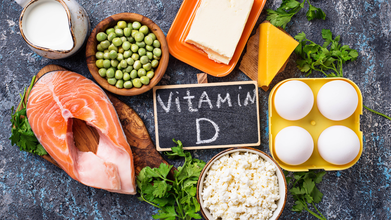- Health Conditions A-Z
- Health & Wellness
- Nutrition
- Fitness
- Health News
- Ayurveda
- Videos
- Medicine A-Z
- Parenting
Foods That Mimic Ozempic Results: Natural GLP-1 Boosters That Control Appetite

The year that just went by, was obsessed with Ozempic and weight loss. Not just that, but it was also the most searched weight loss drug outpacing Wegovy, its closest competitor, by 300%. As of November 2024, it had a current volume of 16 million searches per month.
What is Ozempic?
Ozempic or semaglutide s a prescribed drug that is used in people with type 2 diabetes. It is given as an injection under your skin and could be prescribed off-label for weight loss. However, the drug is not approved by Food and Drug Administration (FDA) for weight loss.
The active ingredient in this is semaglutide, which belongs to the class of drugs called glucagon-like peptide-1 or GLP-1 receptor agonists. This is what helps stimulate pancreas to release insulin, prevents, cravings and hunger pangs and prevents increase in blood sugar. It basically mimics the action of naturally produced hormones GLP-1 by activating GLP-1 receptors to achieve these results.
However, it does not come without any side effects. They can include nausea, stomach pain, constipation, thyroid cancer, and more.
But, what if we tell you that you can try these foods which mimic the results of Ozempic, without these above mentioned side effects?
Also Read: Ozempic Vulva To Ozempic Smell – Unexpected Ways Of Weight Loss Jabs Change Your Body
Filling Foods
These foods are called filling foods, that make you feel full and thus controls your cravings. These are foods high in protein, fiber, and healthy fats which can trigger the release of GLP-1 hormones and other satiety-enhancing effects. Another reason to consider it? These are cheaper than the medications and do not have the unwanted side effects.
Foods that mimic Ozempic effects
Oats: They are rich in soluble fiber called beta-glucan. This can delay gastric emptying and promote feelings of fullness. As per a study published in Current Nutrition Reports, the beta-glucan increases satiety and reduces energy intake by enhancing GLP-1 secretion.
Studies also show that oats can help lower body weigh and harmful LDL- cholesterol levels.
Barley: This also contains beta-glucan, so the effects remain same. Furthermore, the journal Nutrients reported that barley lowered a hunger hormone called leptin.
Legumes, beans, lentils, chickpeas: In one study that included more than 15,000 U.S. adults published in the journal Nutrients found that legume intake was inversely associated with weight gain over the 10-year study period. Adults in the study with moderate to high intakes gained substantially less weight over the past decade than those reporting no legume intake.
Eggs: A study published in Nutrition Research reported that those who had eggs for breakfast reduced overall caloric consumption for the entire day.
Greek Yogurt: It is a healthy, must-have in your diet as it helps you stay fuller longer and also helps with your gut health. Studies suggest that the protein coupled with probiotics enhances satiety and impacts your appetite-regulating hormones to keep your hunger and cravings in check.
Also Read: Mounjaro Price Hike: Here's All That You Need To Know About This Weightloss Drug
Avocado: They are rich in monounsaturated and polyunsaturated fats, which are considered heart healthy. Avocados are also rich in dietary fiber. A medium-sized avocado has 10 grams of fiber, or more than half the fiber you need in a day. The high fat and fiber content of avocados leads to slower digestion, lower blood sugar and insulin levels and elevates hormones levels that trigger fullness.
Fish: The long-chain omega-3 fatty acids in fish along with the high-quality protein help down-regulate your hunger and appetite.
Epstein Files Reveal Secret Muffin Recipe: All You Need To Know

Credit: Canva
As the United States Department of Justice continues to release the harrowing Epstein Files that lift the lid on years' worth of horrific crimes by the convicted American child sex offender, serial rapist and human trafficker, eagle eyed readers have noticed a unique breakfast item in the documents.
In a file titled 'J.E.E Operating Manual', experts found a 11-step muffin recipe named 'J.E.E. Muffin Recipe' that the felon insisted should be served to him every morning at 6.30am.
The Epstein files are over six million pages of documents, images and videos detailing the criminal activities of the financier and his social circle of public figures that included politicians and celebrities.
His co-conspirator Ghislaine Maxwell, who is also a convicted child sex trafficker and sometimes referred to as the "Lady of the House" is serving a 20-year prison sentence at a minimum-security prison camp in Texas.
What Is The J.E.E. Muffin Recipe?
To start off, the recipe involves 12 ingredients which are:
- 4 extra large eggs
- 3 cups Dark brown sugar
- 3/4 cup Olive Oil
- 4 cups Digestive Bran
- 5 cups Whole Wheat Flour
- 12/ cup Ground Flax Seed Mixture
- 12/ cup Flax Seeds
- 5 tsp. Baking Soda
- 1/4 tsp. Salt
- 1 cup Raisins
- 4 cups Whole Milk
- 1 tsp. Vanilla Extract
1. In a large bowl combine bran, flour, flax seeds, baking soda and salt
2. Beat eggs and sugar in the bowl of an electric mixer until thick and creamy.
3. Add oil to egg/sugar mixture and mix to combine. Also combine milk and vanilla and set aside.
5. Add flour and milk mixtures to egg/sugar mixture, alternating additions until combined. Do not over beat mixture.
6. Add raisins and stir until incorporated.
7. Pour mixture into an airtight plastic container and store in the refrigerator for 24 hours before using.
8. Grease large muffin tin with Pam Spray.
9. Fill tins to the top with mixture and top with chopped nut/sugar/flax .
10. Bake at 350 degrees F. for 35-45 minutes.
11. Combine chopped pecans, walnuts and almonds, wheat germ, flax seeds and brown sugar for muffin toppings
While public speculation runs rampant over why this digestion-friendly muffin recipe was a critical part of Epstein's daily routine, as many allege and theorize that it was fed to the children on his island, nutritionists claim that this bran-packed muffins can help your body in multiple ways.
Why Is This Muffin Recipe Good For Your Gut?
Dr. Anshul Singh, Team Lead, Clinical Nutritionist, Artemis Hospitals noted that this baked good is packed with tons of fiber, omega-3, iron and antioxidants, all of which are extremely beneficial for the body.
He tells Healthandme: "People often call this muffin recipe a high-fiber muffin and it is good for your health in small amounts. The fact that this recipe has a lot of fiber is its best quality.
"Digestive bran, whole wheat flour, ground flaxseed and whole flax seeds are all high in dietary fiber. Fiber helps with bowel movements, constipation and overall gut health. Fibre makes stool thicker which makes digestion easier and more regular.
"Flaxseeds also have omega-3 fatty acids which can lower inflammation and improve heart health. Raisins add natural sweetness, iron and antioxidants while eggs and milk add protein that keeps you full longer. Olive oil has healthy fats that help with digestion and the absorption of vitamins that dissolve in fat.
"These muffins might help people who have trouble with slow digestion or irregular bowel movements, especially if they drink enough water with them. But calling them detox or clean-out foods can be misleading. The liver and kidneys are two of the body's organs that help get rid of toxins. The fiber in these muffins is what really helps the digestive system work better.
"The recipe has a lot of sugar and fiber, so it's important to watch how much you eat. A muffin can be a filling, easy-to-digest snack instead of a cure-all."
However, Zoha Shaikh, Consultant Nutritionist at Nutriiya, warns that these muffins may also cause stomach issues including bloating, gas, acid reflux and diarrhea.
She told this publication: "This muffin recipe is rich in fibre and may help relieve constipation in individuals with low fibre intake. However, the combination of very high fibre, sugar, and milk can also trigger bloating, gas, abdominal cramping, loose stools and acid reflux especially in sensitive individuals.
"The high use of baking soda contributes to increased sodium load, making it unsuitable for people with hypertension. From a clinical nutrition perspective, replacing wheat bran with oat bran, reducing baking soda, moderating flaxseed quantity and adding psyllium husk can make the recipe more gut-friendly. Eggs and psyllium together also improve texture and fluffiness while being gentler on digestion."
Is February Feeling Gloomy Without Sunlight? Add These Foods In Your Diet To Avoid Vitamin D Deficiency

Credits: Canva
February often feels like winter’s longest stretch. The days are short, the sun rarely breaks through the clouds, and many people find themselves feeling unusually tired or low. Health experts say this is also the time of year when vitamin D deficiency tends to surface, especially in regions with limited winter sunlight.
While vitamin D is best known for its role in bone health, its impact goes far beyond that. As sunlight exposure drops in late winter, attention is turning to how diet can help support the body until brighter days return.
Why Vitamin D Matters for the Body
Vitamin D plays a key role in several essential functions. It helps the body absorb calcium, which is crucial for maintaining strong bones and teeth. It also supports normal muscle function and keeps the immune system working efficiently.
What is less widely discussed is its role in brain health. Vitamin D receptors are present in many areas of the brain, and low levels have been linked to changes in mood and energy. During winter, many people report feeling sluggish, unmotivated, or emotionally flat. While these symptoms are often blamed on stress or lack of sleep, reduced sunlight and falling vitamin D levels may also contribute.
Why Winter Increases the Risk of Deficiency
The body produces most of its vitamin D when the skin is exposed to sunlight. In winter, shorter days, heavy clothing, and more time spent indoors mean that this natural process slows down significantly. Even people who eat well can struggle to maintain optimal levels during prolonged periods of low sun exposure.
This is where food choices can offer some support, even if they cannot fully replace sunlight.
Fatty Fish as a Natural Boost
Salmon is one of the richest natural sources of vitamin D. It also provides high quality protein and healthy fats that support heart and brain health. Simple meals like oven baked salmon with potatoes and broccoli or a salmon rice bowl with vegetables make it easy to include in weekly meals.
Herring is another strong option. It contains both vitamin D and omega 3 fatty acids, which are known to support heart health. Traditional combinations such as herring with boiled potatoes or a light yogurt based sauce are both nourishing and filling.
Everyday Foods That Add Up
Eggs also contribute small amounts of vitamin D, mainly from the yolk. While they do not provide as much as fatty fish, they are easy to include in daily meals. Scrambled eggs, vegetable omelettes, or a soft boiled egg at dinner can all help increase intake over time.
Mushrooms are one of the few plant based foods that contain vitamin D, especially when they have been exposed to light. They are not a replacement for fish but can be a helpful addition for those who eat little or no seafood.
Food Helps, but Sunlight Still Matters
Nutrition can support vitamin D levels during winter, but it cannot fully make up for the lack of sunlight. Most vitamin D is still produced through the skin, not the diet. Experts advise making the most of daylight when possible, even short walks outdoors, while using food as a supportive measure until spring arrives.
Expert Reveals Why You Keep Gaining Weight Despite Barely Eating

(Photos: Canva)
Recent insights from medical experts show that even people who eat very less can gain weight due muscle mass, stress, and their body’s movement during the day.
Dr Mohit Bhandari, a robotic bariatric and endoscopic weight loss surgeon, founder and director of Mohak Bariatrics and Robotics at Bhandari Hospital Indore notes some people eat whatever they want without gaining weight, while others struggle even with dieting.
The secret lies in the complex interplay of genetics, metabolism, and environmental factors that influence weight management.
This is why are you are putting on weight, according to Dr Bhandari:
1. Metabolism Differences
Studies have shown that metabolic factors are involved in the development of obesity and that being overweight is not simply a result of "sloth and gluttony."The speed at which the body burns calories is different for every individual. A slower metabolism means that even consuming small amount of food can lead to gain.
Individuals with high level of physical activity are less likely to be obese as they mean calories quicker.
2. Hormonal And Lifestyle Factors
Many women experience weight gain during menopause due to a drop in estrogen levels and subsequently fat distribution. This can lead to risk of heart diseases, Type-2 diabetes and joint problems.Hormones like thyroid hormones, cortisol, and play a major role in weight regulation. Stress, lack of sleep and Insulin sensitivity are also factors that lead to fat storage in the body.
3. Loss Of Muscle Mass
When muscle mass decreases due to ageing, inactivity or illness, it often causes a decline in physical activity, which further lowers daily energy expenditure.Consuming a snack rich in carbohydrate with 10-20 grams of protein before and immediately after strength training sessions further acts as a responsible factor in gaining weight.
4. Gut Health And Digestion
Poor digestion can also trigger inflammation, which interferes with blood sugar levels.Additionally, it can also trigger inflammation, which interferes with normal metabolism and insulin function, encouraging fat storage.
© 2024 Bennett, Coleman & Company Limited

